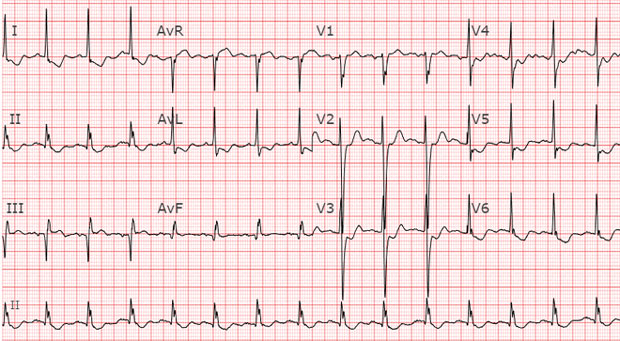Point-of-care HCV test, new Alzheimer's drug approved
This column reviews recent recalls, alerts, and approvals.
Recalls and warnings
A class I recall of the Arrow FiberOptix intra-aortic balloon catheter kit and Arrow UltraFlex intra-aortic balloon catheter kit due to a manufacturing error that may cause the catheter's balloon to become overtwisted, preventing the balloon from fully inflating. There have been 322 complaints, 31 injuries, and 3 deaths reported that potentially relate to this issue.
A correction for HAMILTON-C6 medical ventilators because they may fail to restart ventilation if they enter sensor-fail mode after open suction is performed and the patient is reconnected. Use of affected products may cause serious adverse health consequences, including hypoventilation or apnea, hypoxemia, and bradycardia. One injury and one death have been reported.
A class I recall and correction for HeartMate left ventricular assist system monitor by Abbott Medical due to screen issues that may cause unintentional pump stop. There have been 14 injuries and no deaths reported.
A class I recall and updated instructions for SENSE XL Torso (1.5T and 3.0T) coils from Philips North America LLC due to the potential for the coil to get hot during MRI scans, possibly leading to thermal injury. Risks include serious burns and death. There have been 12 reported injuries.
A correction to the MEGA SOFT, MEGA SOFT DUAL, and MEGA 2000 patient return electrodes by Megadyne after reports of patient burn injuries, especially in children younger than 12 years of age, from their use in procedures. Use of the affected product may cause third-degree burns, scarring, and additional surgeries. There have been 15 injuries reported.
A class I recall of the sub-g endotracheal tube with subglottic suction by Medline Industries, LP, due to detachment or tearing of the inflation tube and other device components from the main tube, resulting in cuff leakage, deflation, moisture buildup, and failure to inflate. If the device comes apart during use, partial or total airway obstruction and choking may occur. There have also been reports that the main tube is susceptible to tearing and the suction port is hard to connect or can detach during use. There have been three reports of injuries.
A class I recall of the vaporizer sevoflurane Maquet filling, part of the Flow anesthesia systems, due to reports of discoloration and/or corrosion within the vaporizer after use with low-water-content sevoflurane manufactured by Piramal or Baxter. Sevoflurane used in the vaporizer may degrade to hydrogen fluoride. This toxic and hazardous acid may present a risk to both patients and health care professionals if it is inhaled or comes into contact with the skin. Two incidents, with no injuries or deaths, have been reported.
A class I recall of Inspire IV Implantable Pulse Generator Model 3028 nerve stimulator due to a manufacturing defect that can cause system malfunctions after implantation, leading to electrical leakage in the sensing circuit. Patients may need revision surgery to replace the generator and restore therapy.
A class I recall and updated instructions for ventilator devices from Zoll Medical Corporation due to missing MRI safety information in the labeling.
Updated instructions for V30, A30, and A40 ventilators by Philips Respironics, Inc., due to a failure in the ventilator inoperative alarm, which can cause therapy interruption or loss. There have been 952 reported injuries and 65 reports of death associated with the recall, first announced in March 2024. Philips also issued a class I recall and updated use instructions for the OmniLab Advanced+ (OLA+) Ventilator.
A class I recall of the Life2000 Ventilator System by Baxter due to the potential for failure of the battery-charging dongle, which can prevent the system from charging or only allow for intermittent charging. Possible adverse health consequences include desaturation episodes, which may range from mild to potentially life-threatening. There has been one reported injury.
A recall of nine lots of Suntegrity Impeccable Skin sunscreen foundation (multiple shades) due to a higher than acceptable microbiological mold count (Aspergillus sydowii) in some tubes of Lot 115BU that developed post-release and over time in a recent test. A topical product contaminated with A. sydowii could potentially cause an allergic skin reaction and related symptoms, as well as a primary fungal skin infection if used on open wounds or sunburned skin.
A recall of 114 batches of potassium chloride extended-release capsules, USP (750 mg) 10 mEq K, by Glenmark Pharmaceuticals, Inc., USA, because of failed dissolution. Failed dissolution may cause high potassium levels, which can result in irregular heartbeat that can lead to cardiac arrest. The firm has not received any reports of hyperkalemia or serious adverse events from spontaneous sources related to this recall. American Health Packaging is also voluntarily recalling 21 batches of potassium chloride extended-release capsules, USP (750 mg) 10 mEq K, on behalf of BluePoint Laboratories due to failed dissolution.
An alert from Medtronic to health care professionals and facilities to stop using NIM Contact EMG Reinforced Endotracheal Tubes. The alert follows a recall notice for removal of all NIM Standard and Contact EMG endotracheal tubes from inventory due to issues with tube blockage. Potential risks include airway obstruction, unintended extubation, bronchospasm, hypoventilation, low oxygen saturation, hypoxia, respiratory distress, abnormal blood gas measurements, cyanosis, apnea, respiratory arrest, cardiac arrest, brain injury, and death.
Miscellaneous
A letter to health care professionals alerting them to disruptions in availability of BD BACTEC blood culture media bottles due to recent supplier issues. The disruption is expected to impact diagnosis, management, and antimicrobial stewardship efforts. The FDA recommends laboratories and health care professionals consider conservation strategies to prioritize the use of blood culture media bottles, preserving the supply for patients at highest risk.
An announcement that the FDA has advised the manufacturers of the licensed and authorized COVID-19 vaccines that the 2024-2025 formula for use in the United States should be monovalent JN.1 vaccines to more closely match currently circulating SARS-CoV-2 viruses.
Approvals
Marketing authorization of Cepheid's Xpert HCV test and GeneXpert Xpress System, the first hepatitis C virus (HCV) test that can be used in point-of-care settings. The test may be performed in settings with a Clinical Laboratory Improvement Amendments Certificate of Waiver, including substance use disorder treatment facilities, correctional facilities, syringe service programs, doctors' offices, EDs, and urgent care clinics. The test detects HCV RNA and delivers results in about an hour using a blood sample from the fingertip. The test is indicated for adults who have signs or symptoms of or are at risk for hepatitis C and is not intended for use in monitoring patients undergoing treatment or for use in screening blood, plasma, or tissue donors.
Donanemab-azbt (Kisunla) injection for the treatment of Alzheimer's disease in patients with mild cognitive impairment or mild dementia. The injection is administered as an intravenous infusion every four weeks. Efficacy was evaluated in a double-blind placebo-controlled study that randomized 1,736 patients. Patients treated with donanemab-azbt demonstrated a statistically significant reduction in clinical decline compared to those given placebo. The treatment carries a boxed warning for amyloid-related imaging abnormalities.
Imetelstat (Rytelo), an oligonucleotide telomerase inhibitor, for adults with low- to intermediate-risk myelodysplastic syndromes with transfusion-dependent anemia requiring four or more red blood cell units over eight weeks who have not responded to, have lost response to, or are ineligible for erythropoiesis-stimulating agents. The treatment received an orphan-drug designation.
Capvaxive, a 21-valent conjugate vaccine for the prevention of invasive pneumococcal disease and pneumococcal pneumonia in adults by Merck.
Pembrolizumab (Keytruda) with carboplatin and paclitaxel, followed by single-agent pembrolizumab, for adult patients with primary advanced or recurrent endometrial carcinoma.
Durvalumab (Imfinzi) with carboplatin plus paclitaxel followed by single-agent durvalumab for adult patients with primary advanced or recurrent endometrial cancer that is mismatch repair-deficient.
Selpercatinib (Retevmo) for adult and pediatric patients 2 years of age and older with advanced or metastatic RET fusion-positive thyroid cancer who require systemic therapy and who are radioactive iodine-refractory (if radioactive iodine is appropriate). The orphan drug-designated treatment received accelerated approval in 2020.
Elafibranor oral tablets (Iqirvo) for the treatment of primary biliary cholangitis in combination with ursodeoxycholic acid (UDCA) in adults who have an inadequate response to UDCA, or as monotherapy in patients unable to tolerate UDCA. Use is not recommended in patients with decompensated cirrhosis. Physicians should also verify that patients are not pregnant prior to starting the drug, inform them of the potential risk to a fetus, and advise the use of effective contraception.
Efgartigimod alfa and hyaluronidase-qvfc (Vyvgart Hytrulo) for the treatment of chronic inflammatory demyelinating polyneuropathy (CIDP) in adults. CIDP is a rare type of immune-mediated, inflammatory, peripheral nerve disorder that affects the myelin sheaths. The treatment was previously approved for adults with generalized myasthenia gravis who are anti-acetylcholine receptor antibody positive.
First-time generic drug approvals
Edaravone injection, 30 mg/100 mL (0.3 mg/mL) and 60 mg/100 mL (0.6 mg/mL) single-dose bags and 30 mg/100 mL (0.3 mg/mL) single-dose vials, for the treatment of amyotrophic lateral sclerosis (Brand name: Radicava)
Emtricitabine and tenofovir alafenamide tablets, 200 mg/25 mg and 120 mg/15 mg, in combination with other antiretroviral agents for the treatment or pre-exposure prophylaxis of HIV (Brand name: Descovy)
Lanreotide injection, 60 mg/0.2 mL, 90 mg/0.3 mL, and 120 mg/0.5 mL, single-dose, for the long-term treatment of acromegalic patients who have had an inadequate response to or cannot be treated with surgery and/or radiotherapy; for the treatment of adult patients with unresectable, well- or moderately differentiated, locally advanced or metastatic gastroenteropancreatic neuroendocrine tumors to improve progression-free survival; and for the treatment of adults with carcinoid syndrome (Brand name: Somatuline Depot)
Note: The FDA states that drugs are not always commercially available immediately after approval.





